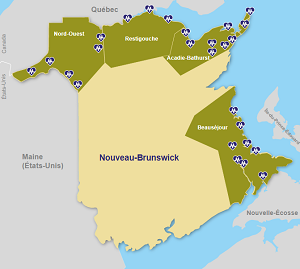Regional health authorities announce plan to address challenges in New Brunswick’s health-care system
FREDERICTON (GNB) – New Brunswick’s regional health authorities have announced measures to reallocate resources to enhance access to services, improve quality of care, and make the health-care system more sustainable.
“We are coping with a severe shortage of medical professionals, an aging population and increasing mental health needs”, said Gilles Lanteigne, chief executive officer of Vitalité Health Network. “These challenges are becoming more and more visible systemwide with 23 service interruptions in areas such as labour and delivery, general surgery and hospital clinics. The changes we will be implementing are designed to improve access and ensure services are there when patients need them most.”
“Working closely with our colleagues at Vitalité, we have proposed these changes based on a careful and thorough review of Horizon’s programs and services, the needs of our patients and clients, and the reality of our staffing resources,” said Karen McGrath, president and chief executive officer of Horizon Health Network. “In order to really improve care, we must make significant changes to the way we are currently doing things. These changes we have announced today prepare us for the challenges we are facing.”

Karen McGrath, president and chief executive officer of Horizon Health Network; and Gilles Lanteigne, president and chief executive officer of Vitalité Health Network
Approximately 35 per cent of physicians, 40 per cent of nurses, and 40 per cent of medical laboratory technologists are eligible for retirement over the next five years – a significant challenge that cannot be managed through recruitment alone. Health-care professionals must be moved from services which are underutilized and redeployed to meet the growing needs of the New Brunswick population. To that end, the following measures are being taken to improve the sustainability of the health-care system, enhance quality of service to patients, and increase timely access to much-needed services. Importantly, these changes will ensure all hospitals remain open across New Brunswick and are better positioned to contribute to the health of their communities:
Optimizing emergency department hours to support vital services
To free up time and resources for physicians and nurse practitioners, the hours of emergency departments in six community hospitals will be adjusted. These hospitals are currently open 24 hours and see, on average, only five patients overnight. Effective March 11, the emergency departments at Sussex Health Centre, Sackville Memorial Hospital, Hotel-Dieu of St. Joseph in Perth-Andover, Stella-Maris-de-Kent Hospital in Sainte-Anne-de Kent, Enfant-Jésus Hospital in Caraquet and Grand Falls General Hospital will operate from 8 a.m. to midnight with the last patient being accepted before 10 p.m.
This model has provided care for patients at Oromocto Public Hospital since 2002. On average, these hospitals see five patients per night, and most are not emergencies.
“In critical situations, such as trauma, heart attacks and strokes – ambulances often take patients directly to larger centres where they can access the specialized services they need,” said Horizon president and CEO Karen McGrath. “These changes will allow physicians and nurse practitioners to see more patients in the daytime, in their community practice.”
Reducing waitlists by more than half
Adjusting the emergency department hours in these six communities will allow for a nurse practitioner to be hired in Sussex, Sackville, Perth-Andover, Sainte-Anne-de Kent, Caraquet and Grand Falls. Nurse practitioner clinics will also open in the province’s largest urban centres to handle high case loads and reduce the provincial waitlist for a family doctor or nurse practitioner by 18,000 people or 54 per cent. In addition, nurse practitioners will also be added to emergency departments in Moncton, Saint John and Fredericton to reduce wait times.
Improving addiction and mental health services
Mental health services will be added in the six communities where changes are being made to emergency department hours. These additional mental heath clinicians will add to the resources that currently exist in these communities. To further address this growing need, the regional health authorities are developing a new model of care to reduce wait times and offer a broad range of services in community mental health clinics.
Converting 120 acute care beds into long-term chronic care beds
In the six hospitals with changes to emergency department hours, the regional health authorities will convert acute care beds to long-term chronic care beds, recognizing most are already used today by seniors waiting for an alternative level of care in the community or a nursing home. By officially re-classifying them as long-term care beds, this will allow staff to support acute care patients and provide the right resources to these patients to receive more appropriate care.
Ongoing patient-centric decision making and planning
The regional heath authorities have also announced they are reviewing several service areas to better deal with wait times, the aging population and rising demand for mental health services. Areas under review include the creation of a centralized co-ordination and referral model for specialists to reduce surgical wait times across the province, better organizing laboratory services, improving food and environmental services, accelerating nursing home assessments, and creating more comprehensive home-care options in communities through the use of technology, such as text and email to enhance the existing Tele-Care 811 program. Furthermore, the New Brunswick Health Council will launch an independent and transparent review of clinical services offered within the provincial hospitals to identify a more sustainable model.
These changes further build on initiatives that have already been implemented, including eliminating the physician billing number system and strategies aimed at recruiting and retaining nurses, rural physicians, psychologists and paramedics.
Government receives and endorses recommendations
“We are listening to the experts, and I am pleased that the regional health authorities have taken several important steps to improve our health-care system in New Brunswick,” said Health Minister Hugh J. Flemming. “I am confident the plan will improve access to care and quality services – all while ensuring the long-term sustainability of our system for the people of this province and generations to come.”

